ASTANA, Kazakhstan -- It was a snowy onset of winter in October 1937. The order came from Joseph Stalin to deport ethnic Koreans from Russia’s Far East to the barren steppes of Central Asia.
Running out of time to gather their belongings, the Koreans picked up what little they could -- mostly vital rice seeds secured inside their pillows. The “Koryo-saram,” as they have been called, took with them the seeds of hope for their unknowable future.
Many elderly and sick died on the trains used to carry livestock, as they were abrasively hauled across the Eurasian hinterland. They had scarce clothing, water and food, at temperatures chilling to the core. Some 100,000 -- half the number of Koryo-saram that lived in the Russian Far East -- arrived at the railway station in the rural town of Ushtobe in southern Kazakhstan in 1937.
The story of the frontier settlers was preserved and passed on to Roman Kim, deputy of the Mazhilis Lower House of the Kazakhstani Parliament.
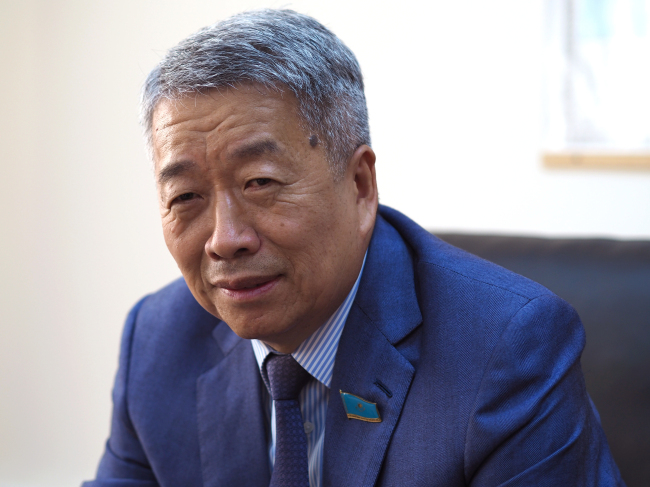 |
Roman Kim, deputy of the Mazhilis Lower House of the Kazakhstani Parliament and president of the Korean Association of Kazakhstan (Joel Lee/The Korea Herald) |
“My ancestors cultivated rice, vegetables and other crops in the harsh land, which was an extremely arduous line of work,” the parliamentarian told The Korea Herald at his office in Astana on June 8. “The field was inhospitable with no irrigation system. They had to carry water on their backs for miles on end before toiling and moiling on the sterile plot of farmland.”
Kim formulates legislation on agriculture, forestry, fishery and public-private partnership. He is also the president of the Association of Koreans in Kazakhstan, a nationwide nongovernmental organization that deals with issues of cultural and interethnic relations and implements business projects through national and global partnerships.
After Kazakhstan gained independence from the Soviet Union in 1991, national movements sprouted across post-communist countries, with diverse ethnic groups asserting their indigenous cultures, traditions and languages, the 62-year-old man said. The Korean association quickly became one of the most active, vibrant and successful organizations in the country, deliberating on national issues and implementing international projects through the Assembly of the People of Kazakhstan.
“We were tossed out onto the frigid wilderness to die in 1937,” the politician said, adding the Koryo-saram were declared state enemies by Stalin. “Pushed to the brink of death, we were supposed to die. But the ‘Good Samaritan’ Kazakhs, defying orders not to assist us, lent their helping hands by sharing their homes and offering us their last pieces of bread.”
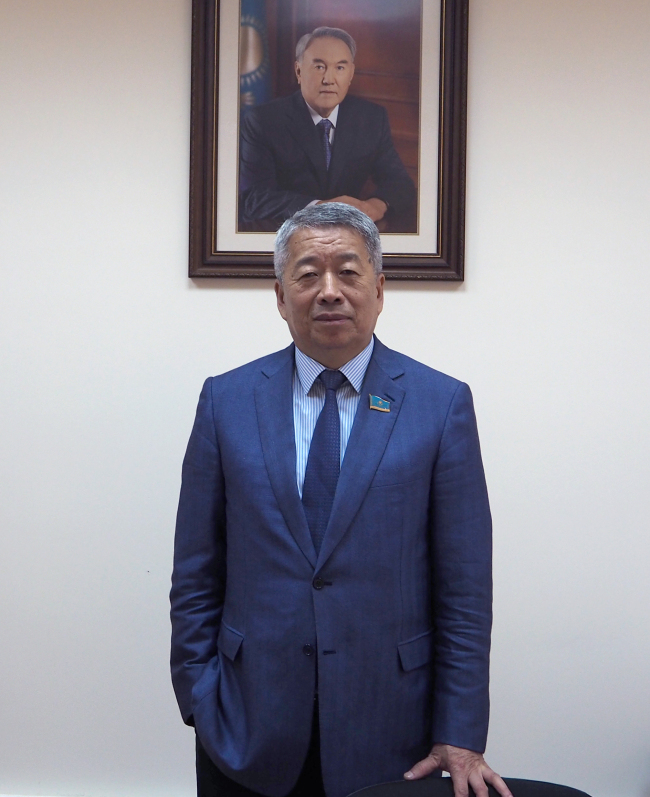 |
Roman Kim, deputy of the Mazhilis Lower House of the Kazakhstani Parliament and president of the Korean Association of Kazakhstan (Joel Lee/The Korea Herald) |
Stressing the Koryo-saram have never forgotten their “unpayable debt,” Kim underscored that Kazakhstan -- where more than 130 nationalities coexist -- is united by a “common history” of people that have undauntedly surmounted their challenges.
During the times of communism, the lawmaker said, the Koyro-saram burnished their educational credentials to ascend the social ladder and reach greater professional heights. They made flowering achievements in various fields, encompassing the public service, agriculture, law enforcement, medicine, education, science and technology as well as the arts and culture.
With the market economy unleashed since the early 1990s, Koreans have sowed their entrepreneurial seedbeds in finance, manufacturing and a whole array of other areas. “The Koreans have been identified here with dedication, honesty, quality and success,” Kim said, highlighting they form an integral pillar of the country’s multinational society.
While acknowledging that most ethnic Koreans across Central Asia have forgotten their mother language, Kim said it was due to their struggle to survive under the Stalinist system, where Russian proficiency was crucial. Unlike other Korean diasporas that voluntarily emigrated abroad, Koryo-saram were forced to leave their motherland in the late 19th century to escape persecution by Japanese colonialists.
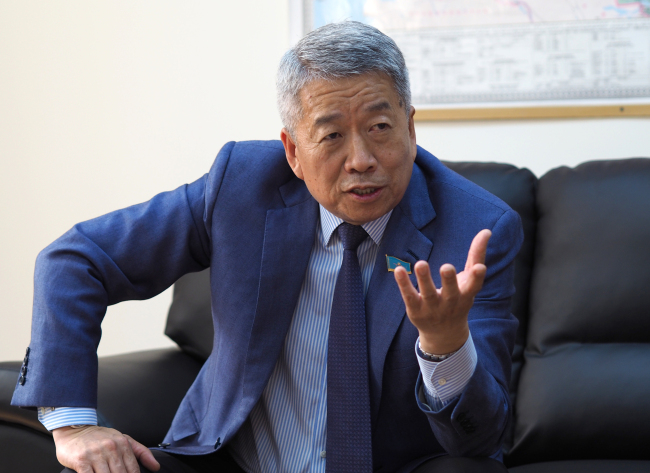 |
Roman Kim, deputy of the Mazhilis Lower House of the Kazakhstani Parliament and president of the Korean Association of Kazakhstan (Joel Lee/The Korea Herald) |
Following the fall of the Iron Curtain, many Koryo-saram in other Central Asia countries started emigrating elsewhere in search of a better life, but those in Kazakhstan stayed. Roughly 100,000 live in the country today -- mostly fifth- and sixth-generation descendants.
“We, the Korean Kazakhstanis, are a living bridge between Korea and Kazakhstan,” Kim underlined. “We have formed a clear position with respect to our historical homeland. We do not ask for any help or financial aid from Korea, nor do we demand our historical rights. What we ask is the encouragement of mutually beneficial relations through increased trade and investment.”
Korean companies with advanced technologies and innovative capacities can invest in the largely untapped Kazakhstani market, the politician said, also recommending joint ventures with local firms.
For Kim, history has come full circle, with his expertise being agricultural legislation. He touted the sector as one of Kazakhstan’s priority industries for development. Kazakhstan is the world’s ninth-largest country by mass, with 22 million hectares of land available for agriculture. It belongs to the free-trading Eurasian Economic Union and is located next to growing Central Asian economies as well as between the vast markets of Russia and China.
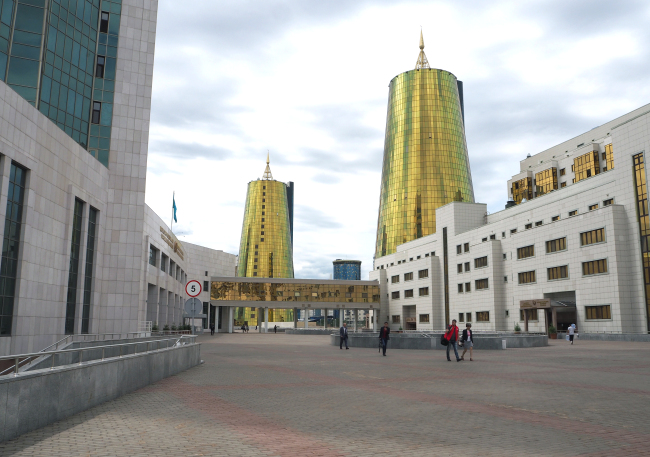 |
The Mazhilis Lower House of the Kazakhstani Parliament in Astana (Joel Lee/The Korea Herald) |
“Adopting smart technologies and automation in the agricultural production is vital,” Kim expounded, citing the shortage of labor in Kazakhstan with only 18 million people. The Korean government, working with the Korean association, provided greenhouses for growing crops in the past, but people didn’t know how to make use of them in the absence of technology and training, he said.
Pointing to Kazakhstan’s abundant natural resources, including uranium, oil and gas, Kim said much synergy can be gained by combining the country’s natural resources and Korea’s human resources. “Investors are protected here with special legislation for them. Our President Nursultan Nazarbayev also pays special attention to foreign investors.”
Kazakhstan is a stable country with clear goals and aims, one of which is to enter the ranks of the world’s 30 richest countries by 2050, according to the parliamentarian. “We also have a foreign policy that aims for friendly relations with all countries surrounding us. With the launch of the ‘One Belt, One Road’ global infrastructure initiative that passes through Kazakhstan, our transport and logistics will be upgraded significantly.”
The Korean association will organize a Kazakhstani-Korean business forum in July as part of the Astana International Expo on the theme of future energy. The event will serve as a platform for scoping out opportunities in both countries and ways to strengthen business cooperation.
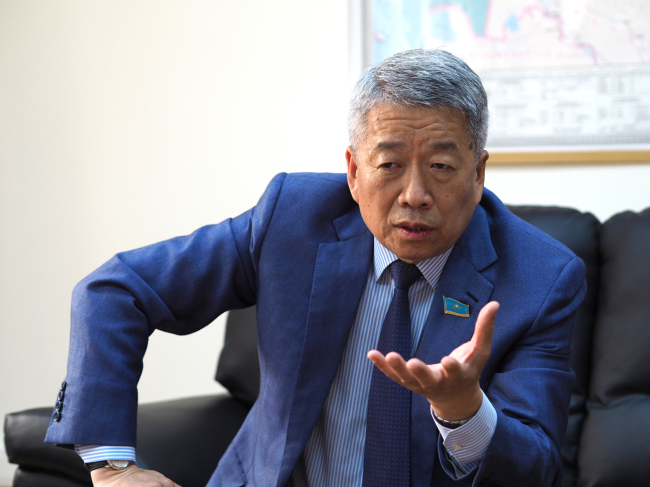 |
Roman Kim, deputy of the Mazhilis Lower House of the Kazakhstani Parliament and president of the Korean Association of Kazakhstan (Joel Lee/The Korea Herald) |
Touching on inter-Korean affairs, Kim said the Korean Peninsula’s division and instability are a concern of the whole world. Korean Kazakhstanis mostly came from North Korea, but harbor no attachment to the communist nation, he contended.
“We stand ready to help both sides reconcile their views through cultural and people-to-people contacts,” the legislator said. “Kazakhstan’s position is that the problems and conflicts can only be solved through peaceful means. War will not bring about unification. But we strongly condemn the North’s nuclear and missile development in ways similar to China and Russia.”
Kim has two children and four grandchildren. His wife is Koryo-saram, a descendant of independence fighter Min Geung-ho, who fought against colonial Japanese in the early 20th century and was bestowed posthumously with a National Medal of Honor in 1962.
“My children also married Koryo-saram, so my grandchildren have 100 percent Korean blood,” he quipped with a smile. “But I don’t know what will happen after my grandchildren.”
By Joel Lee, Korea Herald Correspondent (
joel@heraldcorp.com)
Ed. -- Kazakhstani diplomat Aigerim Seisembayeva contributed to this article through translation and interpretation from Russian.









![[Exclusive] Hyundai Mobis eyes closer ties with BYD](http://res.heraldm.com/phpwas/restmb_idxmake.php?idx=644&simg=/content/image/2024/11/25/20241125050044_0.jpg)
![[Herald Review] 'Gangnam B-Side' combines social realism with masterful suspense, performance](http://res.heraldm.com/phpwas/restmb_idxmake.php?idx=644&simg=/content/image/2024/11/25/20241125050072_0.jpg)

